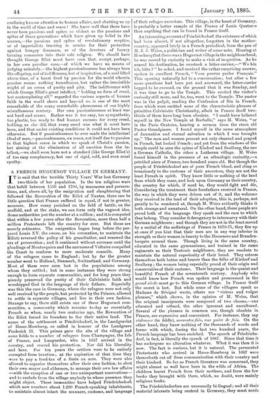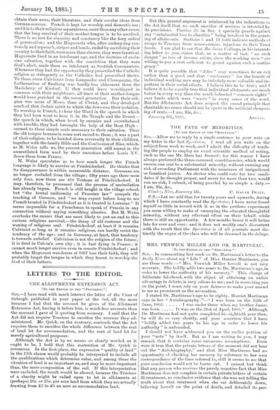A FRENCH HUGUENOT VILLAGE IN GERMANY.
IT is said that the terrible Thirty Years' War lost Germany two-thirds of her population. In the ten religious wars that befell between 1550 and 1706, by massacres and persecutions, and, above all, by the emigration and slaughtering that followed the Revocation of the Edict of Nantes, there can be little question that France suffered in equal, if not in greater, measure. How many perished on the field of battle, on the scaffold, and at the stake, we can form only the vaguest idea. Some authorities put the number at a million ; and it is computed that within a few years after the Revocation, more than half a million Protestants left the country for ever. But these are merely estimates. The emigration began long before the perjured Louis XV. (he swore, on his coronation, to maintain the Edict) reversed the policy of his grandfather, and renewed the era of persecution ; and it continued without surcease until the pleadings of Montesquieu and the sarcasms of Voltaire compelled the Court to conform to more moderate councils. Many of the refugees came to England ; but by far the greater number went to Holland, Denmark, Switzerland, and Germany. Most of them were soon lost in the populations among whom they settled ; but in some instances they were strong enough to form separate communities, and for long years they piously preserved the purity of their Calvinistic faith and worshipped God in the language of their fathers. Especially was this the case in Germany, where the refugees were not only well received by the people, but protected by the Princes, allowed to settle in separate villages, and live in their own fashion. Strange to say, there still exists one of these Huguenot communities, a community which remains to-day as essentially French as when, nearly two centuries ago, the Revocation of the Edict forced its founders to flee their native land. The name of the settlement is Friedrichsdorf, in the Landgraviat of Hesse-Homburg, so called in honour of the Landgrave Frederick II. This prince gave the site of the village and some fields to a number of refugees from Champagne, the Isle of France, and Languedoc, who in 1687 arrived in the country, and craved his protection. Nor did his liberality end here. For ten years the settlers were to be entirely exempted from taxation ; at the expiration of that time they were to pay a land-tax of a florin an acre. They were also allowed to organise themselves after their own fashion, to elect their own mayor and aldermen, to manage their own law affairs —with the exception of one or two unimportant reservations— and to exclude from the village anybody to whose presence they might object. These immunities have helped Friedrichsdorf, which now numbers about 1,200 French-speaking inhabitants, to maintain almost intact the manners, customs, and language
of their refugee ancestors. This village, in the heart of Germany, is probably a better sample of the France of Louis Quatorze than anything that can be found in France itself.
An interesting account of Friedrichsdorf, the existence of which had been almost, if not altogether, forgotten in the mothercountry, appeared lately in a French periodical, from the pen of M. J. J. Weiss, a politician and writer of some note. Hearing at Homburg that there was a Huguenot village in the neighbourhood, he was moved by curiosity to make a visit of inspection. As he neared his destination, he overtook a letter-carrier, —" Wo bin ich, bitte ? " he asked, and received the rather surprising answer, spoken in excellent French, " Vous pouvez parley Francais." This opening naturally led to a conversation ; but after a few more questions had been put and answered, the letter-carrier begged to be excused, on the ground that it was Sunday, and it was time to go to the Temple. This excited the visitor's curiosity still more, and he, too, went to the Temple. The pastor was in the pulpit, reading the Confession of Sin in French, from which were omitted none of the characteristic phrases of primitive Calvinistic Christianity, albeit in France itself twothirds of them have long been obsolete. " I could have believed myself in the New Temple at Rochelle," says M. Weiss, "or in the Paris Oratoire, hearing a sermon from the stern old Pastor Grandpierre. I found myself in the same atmosphere of damnation and eternal salvation in which I was brought up." The men and women present not only chanted and prayed in French, but looked French ; and yet from the windows of the temple could be seen the spires of Kiedorf and Seulberg, the one a German Catholic, the other a Lutheran village. M. Weiss found himself in the presence of an ethnologic curiosity,—a petrified piece of France, two hundred years old. But though the people of Friedrichsdorf are of pure French blood, and cling so tenaciously to the customs of their ancestors, they are not the least French in spirit. They know little or nothing of the land from which they came, and look upon Germany as their country, the country for which, if need be, they would fight and die, Considering the treatment their forefathers received in France, the way in which they were driven out of it, and the welcome they received in the land of their adoption, this is, perhaps, not greatly to be wondered at, though M. Weiss evidently thinks it both strange and unnatural. On the other hand, these people are proud both of the language they speak and the race to which they belong. They consider it derogatory to intermarry with their German neighbours ; and though they are not in the least moved by a recital of the sufferings of France in 1870-71, they fire up at once if you hint that their men are in any way inferior in strength or their women in beauty to the Hesseners and Brandenburgers around them. Though living in the same country, educated in the same gymnasiums, and trained in the same regiments as their Teutonic neighbours, they are resolute to maintain the natural superiority of their breed. They esteem themselves both better and braver than the folks of Kiedorf and Senlberg ; the women being especially proud of their origin and conservative of their customs. Their language is the quaint and beautiful French of the seventeenth century. Anybody who would know how French was spoken and pronounced in the grand si4le must go to this German village. In France itself the secret is lost. But while some of the villagers speak as Madame de Sevigne wrote, others use "vicious and vulgar phrases," which shows, in the opinion of M. Weiss, that the original immigrants were composed of two classes,—one educated and refined, the other ignorant and uncultured. Several of the phrases in common use, though obsolete in France, are expressive and convenient. For instance, they say violonner (to fiddle), sovventes fois, Itne quire de foie. On the other hand, they know nothing of the thousands of words and forms with which, during the last two hundred years, the French language has been enriched. The speech of Friedrichsdorf, in fact, is literally the speech of 1687. Since that time it has undergone no alteration whatever. What it was then it is now. The fact is curious, but it is natural. The persecuted Protestants who arrived in Hesse-Homburg in 1687 were thenceforth cut off from communication with their country and their kindred. So far as French literature was concerned, they might almost as well have been in the wilds of Africa. The children learnt French from their mothers, and from the few books they brought with them, which, no doubt, were mainly religious books.
The Friedrichsdorfers are necessarily bilingual; and all their material interests being centred in bermany, they must needs
obtain their news, their literature, and their secular ideas from German sources. French is kept for worship and domestic use; and it is to their religions separateness, more than any other cause, that the long survival of their mother-tongue is to be ascribed. There is no test for sincerity and constancy like the fiery ordeal of persecution ; and the Huguenots who, after undergoing contumely and reproach, stripes and bonds, ended by sacrificing their country to their faith, were more than sincere, they were fanatical. Huguenots lived in an intolerant age, and the doctrine of exclusive salvation, together with the conviction that they were God's elect, made them as intolerant as Scottish Covenanters. Whenever they had the opportunity they proscribed the Catholic religion as stringently as the Catholics had proscribed theirs. To those stern Calvinists from Languedoc and Champagne, the Lutheranism of Seulberg was hardly less abhorrent than the Mariolatry of Kiedorf. If they could have worshipped in common with their neighbours, all trace of their mother-tongue Would have perished in the second generation. But their religion was more of Moses than of Christ, and they developed much of that Judaic spirit to which the Jews owe their isolation. To worship in French, to hear the Word in the speech in which they had been wont to hear it in the Temple and the Desert— the speech in which, when beset by enemies and overwhelmed with trouble, they had besought the help of the Most High— seemed to these simple souls necessary to their salvation. Thus the old tongue became in some sort sacred to them ; it was a part of their religion, to be handed down reverently to their children, together with the family Bible and the Confession of Sins, which, as M. Weiss tells us, the present generation still repeat in the unmutilated form used by their ancestors before Louis XV. drove them from France.
M. Weiss speculates as to how much longer the French language is likely to survive at Friedrichsdorf. He thinks that its disappearance is within measurable distance. Germans are no longer excluded from the village ; fifty years ago there were only four, now there are 400 Teutons at Friedrichsdorf. It may, therefore, be presumed that the process of assimilation has already begun. French is still taught in the village school, but "the brutal uniformity of Prussian law" compels the teaching of German, and " we may expect before long to see French treated in Friedrichsdorf as it is treated in Lorraine." It seems impossible for a Frenchman to speak of Prussia in any connection without saying something abusive. But M. Weiss overlooks the causes that are most likely to put an end to this curious religions survival,—the decay of old customs and the waning of religious zeal. Friedrichsdorf, at least if it remains Calvinist so long as it remains religious, can hardly resist the tendency of the age; and in Germany, at least, that tendency is towards unbelief. Calvinism is not the religion of the future; it is dead in Calvin's own city ; it is fast dying in France ; it cannot much longer survive even in remote Friedrichsdorf ; and when the Huguenot wanderers of 1687 lose their faith, they will probably forget the tongue in which they learnt to worship the God of their fathers.







































 Previous page
Previous page